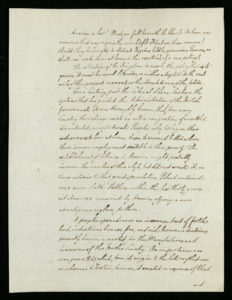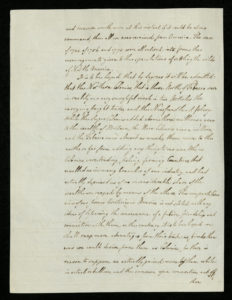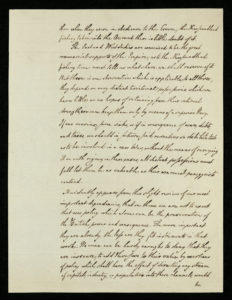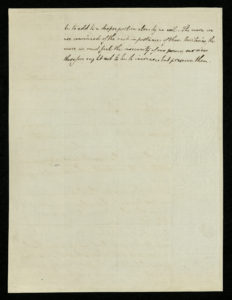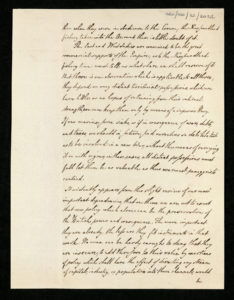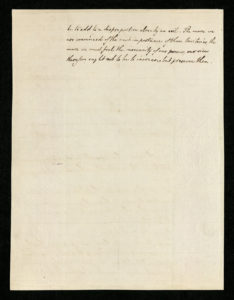America Lost? The Birth of Britain’s Capitalist Empire
Justin B. Clement, Ph.D. Candidate in United States History, University of California, Davis
Jump to Transcription & Images
The 1783 Peace of Paris brought a grueling eight-year war to an end, but its generosity shocked many Britons to the core. By offering lenient terms in the treaty negotiations, Prime Minister William Petty, Lord Shelburne, hoped to draw the United States away from the Franco-American alliance and foster a mutually beneficial trade with Britain.[i] Yet many in Parliament staunchly opposed granting fishing rights off the coast of Newfoundland.[ii] John Holroyd, Earl of Sheffield proclaimed: “the Navigation Act itself, the guardian of the prosperity of Britain, has been almost abandoned by the levity or ignorance of those who have never seriously examined the spirit or the consequence of ancient rules.”[iii] But if the Georgian Papers Project reveals anything, King George III certainly understood the “ancient” traditions of his country—as well as the stakes involved.
In the Royal Archives at Windsor Castle, nestled among the papers of George III, a single essay proclaims: “America is lost! Must we fall beneath the blow?”[iv] At first glance this declaration seems to reinforce the stereotyped image of a bitter and mournful King George III. But under closer scrutiny, the essay champions a radical notion: that Britain can profit from commerce outside its colonial reach. In short, the treaty favored laissez-faire capitalism in place of colonial mercantilism. Opposing this, Lord Sheffield declared, “The independence of America, has bewildered our reason and encouraged the wildest sallies of imagination; systems have been preferred to experience; rash theory to successful practice.”[v] So how did King George III—a staunch opponent of American independence—come to embrace the unproven capitalist model? Context in the Georgian Papers provides clues.
George III’s essays include notes taken almost verbatim from a variety of texts, often without attribution of source material. Rather than slavishly copying, he transcribed specific quotes to the exclusion of other material. The “America is lost!” essay contains text mostly excerpted from Arthur Young’s 1784 volume, Annals of Agriculture—or perhaps an earlier unpublished draft.[vi] Young asks the rhetorical question: “have we resources that may repair the mischief?”[vii] George III’s editorial discretion in answering this question highlights a departure point between the two men’s views. The king transcribed what he perceived to be useful wisdom, and because of this editorializing, his essay on the loss of the American colonies is particularly revealing.
Young follows a humanistic and anti-imperial stance, arguing: “the loss of India! That day must come.—It ought to come. …we must be driven out of India with abhorrence and contempt, and all the people of the globe would rejoice in the event.”[viii] By leaving these segments out of his copied excerpt, George III would not admit to defeatism, nor would he abandon the idea of empire wholesale. Where Young stressed isolationism and contracting British imperial holdings, the king’s choice of excerpts instead emphasized international trade.
The old “Colonial Scheme” comprised a mercantilist system where much of the wealth from commerce stayed within the empire. This proved advantageous when the American colonies “became a market for the Manufactures and Commerce of the Mother Country” and the West Indies and American South provided cash crops. But the Mid-Atlantic and New England colonies “were in reality our very successful rivals in… the carrying freight trade, and the Newfoundland fishery.” Spared the expense of defending them, Britain would “reap more advantages from their trade as friends than ever we could derive from them as Colonies.”[ix]
Throughout the piece, words like “actually” or “in reality” describe a sea change in thought. Historians have long placed 1783 as the watershed moment separating the First and Second British Empires. In this moment, King George III envisioned a laissez-faire policy that did not wholly depart from mercantilism or settler colonialism, but reinforced a radical new alternative: informal empire and conquest by capitalism.[x] “The situation of the Kingdom is novel,” he wrote, “[and] the policy that is to govern it must be novel likewise.”[xi]
George III Essay, America is Lost!, ‘Essay on America and future colonial policy’, RA GEO/ADD/32/2010-2011
[i] Piers Mackesy, “Conclusion,” in The War for America: 1775-1783 (Cambridge, Mass., 1964), 505-22.
[ii] Article 3, Treaty of Paris, 1783; International Treaties and Related Records, 1778–1974; General Records of the United States Government, Record Group 11; U.S. National Archives.
[iii] [John Baker Holroyd, 1st Earl of Sheffield], Observations on the Commerce of the American States with Europe and the West Indies; Including the Several Articles of Import and Export (London, 1783), 1.
[iv] King George III, “America is lost!” essay, ca. 1783-1784, Royal Archives, Additional Georgian Papers, Add. MSS 32/2010/11. Historian John L. Bullion argues that this essay must be written before the peace treaty was concluded in 1783, but a generous interpretation of “time must tell” could expand the timeframe. See: Bullion, “George III on Empire, 1783,” William and Mary Quarterly LI, no. 2 (Apr., 1994), 305-10.
[v] [Lord Sheffield], Observations, 1.
[vi] I am indebted to Angel-Luke O’Donnell of King’s College of London for this insight. See: Arthur Young, Annals of Agriculture; and Other Useful Arts, Vol. I (London, 1784), 13-19.
[vii] George III, “America is lost!”
[viii] Young, Annals of Agriculture, 17.
[ix] George III, “America is lost!”
[x] Young criticized the economist Adam Smith, but there are still echoes of his ideas throughout the essay nonetheless. See: Adam Smith, An Inquiry into the Nature and Causes of the Wealth of Nations, 2 vols., ed. Edwin Cannan (New Rochelle, N. Y., 1966), 535-626, 895-900; and Bullion, “George III on Empire, 1783,” WMQ LI, no. 2 (Apr., 1994), 305-10, esp. 307-08.
[xi] George III, “America is lost!”
Transcription: America is Lost! (Essay on America and future colonial policy)
Transcription provided is the raw transcription, initial product of student transcribers. Text is not corrected nor proofed.
Download full raw transcription: RA GEO_ADD_32_2010_Raw Transcripton (pdf)

